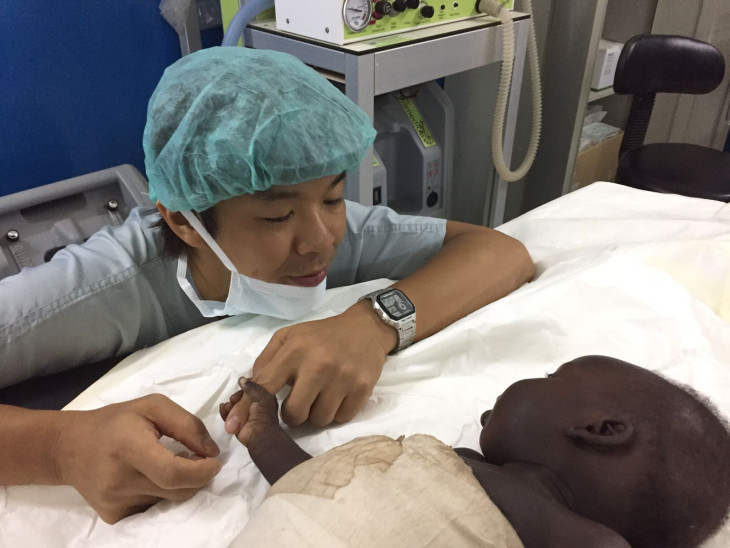In South Sudan, insecurity is a constant challenge to healthcare services

South Sudan has been grappling with protracted conflict and violence, often impacting many people’s lives. Many communities struggle to build resilience by accessing primary health care, food, and water amid volatile security situations.
n 2017, I was on my second posting with the International Committee of the Red Cross (ICRC) as an anesthetist at the Maiwut Hospital in South Sudan. With a community of nearly 80,000 people, Maiwut sits at the border of Ethiopia and South Sudan and in the middle of dry land. Beyond the medical facility's perimeters are miles of dusty, treeless landscape stretching to the horizon. The medical base didn't have many amenities – no recreational facilities, no, no showers – so I had acclimatized myself to accepting that night comes early here.
Resting in my tukul, a traditional mud dwelling with a thatched roof, one evening, it felt like any other normal day where everything is quiet after sunset, except for the faint sound of gunshots heard over the distant hills and the chirping of the birds and insects in the stillness of the night. Except this was no ordinary night. What transpired that evening had such an impact on my life that it would see me return to South Sudan year after year to join the ICRC's remarkable medical teams.
A fierce exchange of gunshots throughout the night created chaos for the medical team the next day. From as early as dawn, the relatively quiet surroundings turned frantic as people were rushed in with life-threatening bullet wounds. Dozens of seriously wounded men were transported by air to the surgical team in Maiwut following intense inter-communal violence between tribes. The injured needed to be operated on urgently, so we called for backup from our main delegation in Juba and had to set up extra operating tables where we performed surgeries from morning to night. With limited supplies available, treatment methods had to be adjusted and simplified.
I distinctly remember one wounded man who was brought in. He was thin and probably in his teens, with dry, cracked lips, torn clothes, and bare feet covered with dirt. He stared aimlessly into the air, waiting for medics to treat the gaping wound on his left leg. I found out later that his family had lost everything in the fighting, which left many dead and displaced as they fled the violence. I also learned that if the men died or were seriously injured as a result of fighting to protect their tribe and communities, they would be considered honorable fighters and earn the respect of their people. This young man may have lost his family, but he was aware of how his actions would be seen in his community. While there were casualties during the fighting, we managed to save the lives of all those we treated that day.

Naumi Otsuka at the operation theatre based operated by ICRC in Maiwut Photo: ICRC
In most of my ICRC assignments in South Sudan, I was almost the only anesthetist onsite, and that meant being available 24 hours to attend to emergencies. One of the challenges I faced quite often was being called at odd hours of the night to administer anesthetics to pregnant women in need of emergency C-sections after walking for hours to reach the hospital. Getting to the nearest clinic remains one of the main obstacles for people who often have to walk for hours and even days to access essential healthcare services. It's even more dangerous and difficult for women amid South Sudan's conflict and violence who face the risk of dying during childbirth when forced to travel on foot to reach the nearest health facility or give birth at home.
Conflict and armed violence between warring actors and poor road conditions often make it impossible to provide healthcare to wounded or critically ill people. Our teams do their best to provide primary and specialized healthcare and respond to emergencies and outbreaks affecting isolated communities in areas that are, at best, reachable by mud and dirt tracks.

ICRC hospital and premises in Akobo, Pbor, South Sudan. Photo: ICRC/Naumi Otsuka
Meanwhile, South Sudan has been grappled with stark humanitarian challenges since its independence in 2011, with more than seven million people, out of an estimated population of 12 million, reportedly facing food shortages A further two million people have been internally displaced attributed mainly to conflict, violence, underdevelopment, and climate change.
I found South Sudan a challenging humanitarian context with the prolonged insecurity and disruption of essential healthcare. I have seen a lot and have learned a lot during my time there. Some days are worse than others, but the fact that we can be there for so many wounded and sick people during conflict and violence makes it worthwhile.
Looking back, despite the tremendous challenges and ups and downs, I maintain my optimism that we can address humanitarian needs like safe access to adequate health care working alongside with communities impacted by violence and conflict.
I ended my fifth posting in Akobo in December 2022 and returned to Tokyo, where I have my everyday life as a Red Cross anesthetist. If given another chance to return to South Sudan, I will gladly accept it.
By Naomi Otsuka as told to Gillian Hickes
Naomi Otsuka is an anesthetist and is the Vice Director of the Department of Intensive Care Medicine at the Japanese Red Cross Medical Center and is seconded to the ICRC in South Sudan for short missions.



